| PEOPLE |
YEAR: 1991
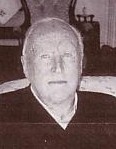 |
You can still find Len Butterfield at the races. Not in splendid isolation as he used to be, because 12 years have gone by since he retired from the solitary job as chief stipendiary steward with the Harness Racing Conference.
As much as anything else in his twilight years, he enjoys getting on the track and meeting the people who love their horses. He arrives with the same tall and regal bearing, and a hat always a hat, which used to be compulsory gear for Conference stewards.
At 77, racing is just one of his retirement interests. He plays his golf at the upmarket Russley club, where he says his handicap is "very competitive," he has his bowls and he likes to get into the garden.
No different to most industry people, he likes hearing the latest story on what's going on; for instance..."this bicarbonate business, interesting to see how that goes...In my mind if anyone returns a positive, and this is what this is, then out they go." Since his retirement at the age of 65, Butterfield often reflects on the changes in the conditions and demands of a stipes job. "It's luxury compared with what it was like when I started, with Fred Beer."
Butterfield was 32 when he took the position as a stipendiary steward. He knew all about horses. He rode work at Addington, where his father, Arthur, was a prominent trainer, winning big races with such good horses as Acron, Agathos, Glenelg and Lady Scott; Agathos won the NZ Cup in 1924.
He was a natural sportsman, shining especially at cricket, representing New Zealand, though he has been a success at anything he has taken up. He was first employed in the plumbing trade, which he didn't like, and then joined the New Zealand Trotting Association as a deputy stipendiary steward, joining Beer and Jack Shaw. In those days, there was a lot of travel, in trains and buses, and the odd plane ride. We would go down to Oamaru on the day before the races, and catch the express on the way back, getting into the station about 8pm.
"And when we went to the Coast to do the trots on a galloping day, I would catch the 2:20am railcar on Saturday morning, which got us in about 7am that morning. Then I would be on the 6pm railcar back, which got in at about 11pm. When we went to Westport, we'd get off at Stillwater, have breakfast at the railway station, and wait for an hour and a half for the railcar up from Ross." The Coast trips were a test of stamina. On one trip, by car on the gravel road, the fog was so thick over the Pass that Conference handicapper Arthur Neilson was sent forward on foot with a torch to see where they were going.
Another 'luxury' he didn't have for many years was a race film. "In my day there was no camera, so I had to become an expert in race reading. You had to depend on evidence, and you had to know if anyone was telling lies. The drivers often tried to look after one another. I'd get to know their colours. I'd have my book, pencil and glasses and I wouldn't take my eyes off the race while I was writing something down. These days, if they miss anything during the race they can soon check up by watching the film."
The NZ Cup won and lost by Stella Frost was a case when there was no official film, though there was an unofficial one he was able to make use of. "'Doody' Townley had eased off the fence, and some of the horses behind had been squeezed up. If there was a fall someone had caused it. It was a serious matter, and eventually the horse was put out. At the inquiry it was like getting blood out of a stone. Much later, when I spoke to the Balclutha OTB, I stayed with Len Tilson, he owned Stella Frost; it was nice of him to ask me to stay with him."
A stipendiary steward can be a lonely job, though Butterfield said the responsibility never worried him. "The Devine-Litten whipping case in 1957 was the biggest I had, and I was the only one to see it start. The funny thing was the patrol steward didn't see it. I said to him 'that is bloody lovely, you should not be out there if you can't see.' I never really found out who moved first; I suspect what happened but you could never prove it. George Noble, who was right behind them, was swinging both ways so I had no evidence. The difficulty was that I had to do it on my own. It went on to late in the night, and the phone at home never stopped ringing."
Butterfield said he found most trainers and drivers took their penalties well. "Ted Lowe got two years on a positive, shook hands later and said 'you've got a job to do.' Cecil Donald was the same. I disqualified a horse of his from the Timaru Cup - I think it was Chief Command - and he appealed. He told the late Peter Mahon that he had to win the case because I was taking thousands of dollars off him and I had to be straightened out. I always admired old Donald. He would have 20 to 30 horses in work, three stallions, cattle and a dairy farm, and he'd be up and on the phone at 5am getting business done."
Butterfield has a deep admiration for some of the top horses that raced when he was younger, particularly Highland Fling. "I've seen nothing faster. He'd go from last to first in a furlong and a half." He had great respect for the likes of Young Charles, Johnny Globe, Chamfer, Soangetaha and Vedette who all raced in the same era. "You had to admire those horses when you look back. Take Acron. He ran a mile at Addington in 1924 in 2:03.6, he never pulled a wide sulky, went on the clay and was never near the fence. Tracks these days can make horses better than they are. As far as grass tracks went, New Brighton was the best in New Zealand; it was like a lawn."
Butterfield sat on many swabbing cases, and made a study of drugs and how they affect horses. "We don't want people in the game if they're corrupt. I remember having a case once where a horse has returned a positive to caffeine, and the trainer said the horse had drunk a lot of tea. So I went round there one morning and he offered me a cup of tea. I said I wouldn't have one but we'll make one for the horse. Well, he wasn't too keen about that, but we filled up a bucket and took it out to him. He just snorted and wouldn't touch it. The chap got two years."
Like everyone else with the welfare of the industry at heart, he sees the decline in attendances as a worry, and like everyone else, knows the lack of good handicappers is caused by huge stakes now available for two and three-year-olds. "It is common to try those young horses out to see if they can win that money and there are so many more trials for these horse. It's easy to burn them out." He has no answer to why crowds aren't as big as they used to be. "There were top horses at the Easter meeting at Addington, but there wasn't a big crowd. Why is it?"
Still with his good health, Len Butterfield will continue to show a fatherly interest in the family sport.
Credit: Mike Grainger writing in HRWeekly 8May91
YEAR: 1991
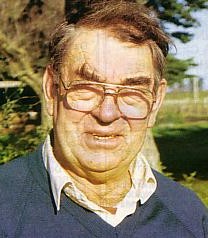 |
Eric Ryan thought he would be driving next season. He told Jeff Rohloff on his last trip to Hutt Park that he had another year to go and he'd be back with a team of horses.
The way Eric knew it, he had been born in 1927, and didn't retire until the end of thw 1991-92 season. When the official word through that Eric was in fact a year older than he thought - that he was 65, not 64 - he bought a birth certificate to see just how old he was. "It flattened me when it hit me," he said in his raspy way. He was dead keen to do a few more laps on the track at Hutt Park, for one last trip down memory lane, because it was the scene of his first driving success. Francis John was between the shafts for his first win on November 5, 1969, his birthday, and he followed that up three races later winning with John Peel.
Eric could talk for hours on the grim and entertaining incidents that have made him such a huge personality in harness racing. The stories he tells are as big as himself, and note that Eric is 18 stone and 6'4". Like his size, the stories are tall, but real. He has been in the wars with officialdom, notably the long, costly and bitter battle with the Harness Racing Conference on a corrupt practice charge following the selection of a maiden field at an Akaroa meeting, and once he made banner headlines in a sports paper when he was buying up cheap horse and selling them for pet meat. He said at the time: "I reckon I'm doing the industry a good turn. There are so many horses around that can't get starts."
Nothing annoys him more in harness racing than inconsistent penalties from the stipendiary stewards, and he doesn't mind saying so: Eric has always been a straight talker. One episode he puts ahead of the rest was at Greymouth where he was racing Big Idea, not an easy horse to handle, off the unruly mark and 10 behind. "He flew off the mark and I got him into the one-one. It was the best run I have ever had in a race. The thing I'm following was hanging something bad, so I gave it plenty of room when I come out and we run a beautiful second. "And we lost it...got put out...because they reckoned the horse in the open galloped and I'd interfered with it. Through that, I lost the horse; he won his next start and was sold to America. That really hurt me."
He was also disappointed in the months of hard work he put into the c2 pacer Pelorus Jack, and failed to get a start. Ellen, Eric's wife, then played a tape, showing the son of Byebye Bill in handsome form beating Charming George in a trial at Addington three years ago. "He won five trials," recalled Eric, "but didn't get a start for seven months, the whole time I had him." He was sold, and went to Australia. The next tape Ellen played showed Pelorus Jack in Sydney, where he took a record of "1:58.7. "I don't know what else I had to do with him here," he said.
Eric has always been a 'battler's' man. He has bred, trained and won with horses with no good commercial connections. He started as a shearer and later bought the butcher shop at Little River, where he was born. When the shop closed for the day, he would start working the horses, usually about 6pm. They would gallop four miles up the hill at the back of the shop and walk home. "We had no young ones. They were old horses and cast-offs."
Eric soon had a remarkable reputation of buying horses for the price of a ride in the float, and for standing at stud horses who otherwise would have been lucky to find a home. Few of his horses ever had much in the way of social standing. "I bought Eone Navarre at the 'Swamp' (hotel) one night for a shilling, and he won two for us at Greymouth."
Eric has a library of tales about horses he bought cheaply, horses he bred from obscure or unfashionable pedigrees to win races, and horses with little bent manners he straightened out. One of the first he bred and gaited, and perhaps his best horse, was Atlee. Driven mainly by Steve Edge, Atlee won seven races in seven months, including two in one day at Nelson and the Cheviot Cup when Jack Smolenski handled him. Eric said he was a great front runner. He was bred by Spring Jinks, who Eric stood at stud, from Synthetic, by Protector he bought from Bob Negus for £5. Spring Jinks sired only three foals - Atlee, Two Bob and Polly Jinks - and they all won. Synthetic served Eric well, leaving six winners. While Atlee was the best he raced, Eric always maintained he had a better one that didn't race. This was Yonder Chief, which he owned with Jim Dalgety and sold the day he qualified. He went to the US and took a record of 1:52.
He rarely brought a favourite home. Polly Creed once paid $111.80 and Limbala - "she loved to sit in the death" - returned $55.60 when second in a division race at Motukarara.
His best season was in 1980-81 when he drove 13 winners and trained 18. Expeditions away from home were part of the Ryan campaigns. "We'd go away for weeks at a time. On one trip up north we were away eight weeks and won 11 races," he said. "I really appreciated going to Auckland for the first time, and winning two races on the opening night with Avon Spark and Viva Remero. They won 11 races between them and Viva Remero beat Jenner in the Rosso Antico." Among his other winners have been Advanced Fibre, Always Smile, the tough mares Waitara and Sidi Rezegh, Haughty Choice, Big Idea (Taranaki Cup), Royal Delivery (Marlborough Cup), Commanche, Ungava, Leanne's Pride, Wish Me Luck, Up To You, and the most recent, Jerlin's Choice in the last Reefton Cup.
"I love driving, I train them, I know them. I took me 10 years to get a licence. I had a gutsful by the time I got it, but it came eventually, and I have had some good horses. A man of my size is not so good to a horse if a track is wet, but it's all right if a track is reasonable. I know Jerlin's Choice pulls me no trouble at all and he is only a little horse."
Off the track, Eric did what he could for harness racing. He was a foundation member of the Motukarara Trotting Association, served on the committee of the Standardbred Breeders Association, the NZ Owners, Trainers and Breeders Association, the Akaroa Trotting Club, and the Banks Peninsula Trotting Club. He has a paddock full of young horses, by rather unpopular sires such as Kiwi Kid, Worthy Del and Byebye Bill, to be tried, but it is a job he is just not up to at present. An operation last April to replace a hip joint has left him on a crutch and Ellen is doing most of the stable work. For Eric the driving days are over, even if he would like to think it's a year too soon.
Credit: Mike Grainger writing in HRWeekly 17Jul91
YEAR: 1991
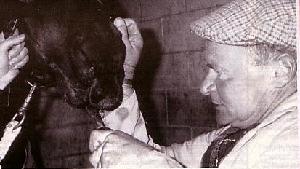 |
When it comes to the care of his teeth Bill Beck prefers to let MacLeans freshmint and the toothbrush do the job - he is not a big fan of the dentists chair and hasn't faced the drill for many years. But when it comes to the horse dentistry business which he took over four years ago when his son Peter departed for Austalia it is another story.
The 50-year-old works seven days a week most of the year around the harness and galloping stables of the South Island and his unusual trade also takes him to the Feilding stables of Maurice Campbell every three months. "People give me some bloody strange looks when
I tell them I'm a horses dentist. A lot say they have never heard of the job."
Bill packs a bag of tools into his Pontiac Le Mans which include a wide range of rasps, tweezers and teeth pulling devices. When visiting a stable he checks the teeth of each horse and generally pulls out caps from those aged between 2 and a half and 4 and a half and files down sharp teeth. Horses have no nerves in their teeth apart fron their wolf teeth and rarely need tranquilising. Generally it takes between 10 and 20 minutes to do each horse depending on the state of it's teeth and the facilities available.
Most racing stables get their teams checked every six months and Bill is on the road a great deal. It is well known that horses with bad teeth don't race kindly. He recalled a recent case when a young trotter had been going along well but suddenly started hanging and breaking for no apparent reason. Bill was called in and ended up pulling eight teeth with the horse recovering quickly and qualifing two weeks later.
Still working a team of six thoroughbreds at Riccarton, Bill's schedule last week was pretty typical. On Monday he was attending to ponies and hacks at Rangiora, Tuesday at Riccarton, Wednesday at the Mid-Canterbury stables of Jim Ferguson and Mike Heenan, Thursday at Tim Butt's West Melton stable, Friday back to Ashburton to galloping stables, Saturday out to Oxford for more ponies and hacks and the same at Leeston on Sunday.
"You don't get much time off. When Peter (who is working as a horse dentist based in Newcastle) went to Australia I was just filling in until he got back and I never expected to get so busy. I learned the trade from him and Jimmy Tomkinson but like anything the more you do the more you know."
Credit: Gary Birkett writing in HRWeekly 17Jul91
YEAR: 1991
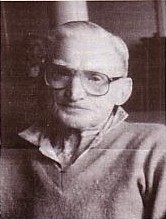 |
The death occurred at the weekend of the successful trainer and sportsman, Alf Bourne.
Widely known as 'Ginger', Bourne was a jockey, boxer and footballer. He was in his prime in the 1930s, playing breakaway for the Canterbury rugby team, and in 1933 he beat Bill Pascoe to take the NZ heavyweight boxing title. He was a loyal Merivale man, coaching the senior team and later became a life member.
He spent more than 50 years training horses, including many that reached top class. Waitaki Hanover, who won the Hunter Cup in Melbourne, the Auckland Cup, the Rotorua Cup, the Flying Handicap and the Summer Cup in Sydney, was one of the best. He had a soft spot for Mister Chips because he used to get homesick and cheer up as soon as he returned home, and with the ill-fated Vanderford he won 11.
After winning four races for Don Hayes, Vanderford joined Bourne's stable, and won six in succession at the start of his 4-year-old campaign, notably the Methven Cup off 48yds, the Laing Handicap from Rustic Lad and Flying Blue, the Flying Stakes at Ashburton from Robin Dundee and Cardigan Bay, and the Hannon Memorial. He was the beaten favourite in the NZ Cup won by Cardigan Bay. He was never so good at five, where his only win was at Forbury Park.
Vantage, Larnie Scott, Doctor Scott and the speedy trotter Al Mundy were among other good horses he trained.
Aged 81 at the time of his death, Bourne continued to follow sport, especially rugby which he loved so much, during his retirement.
Credit: Mike Grainger writing in HRWeekly 9Oct91
YEAR: 1991
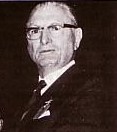 |
Though he maintained a very low profile in horse racing, Auckland brewery baron and philanthropist Sir Henry Kelliher, who died recently aged 95, was an enthusiastic and sporadically successful breeder of standardbreds and thoroughbreds.
Sir Henry will probably be remembered best in harness racing for giving Aucklander Mrs Audrey Dean's champion pacer Cardigan Bay a luxurious retirement at his island paradise, Puketutu, in the Manukau Harbour. From Match 1970 until Cardigan Bay died aged 31 in March 1988, Sir Henry doted over the internationally famous gelding, who attracted thousands of tourists from around the world to see in the flesh the first pacer to win a million dollars. "I think he must be the most photographed horse in the world," Sir Henry would often proudly say.
But Sir Henry's involvement in the standardbred sport went much deeper. His crowning achievement was to rank as the breeder of 1979 Inter-Dominion Grand Champion pacer Rondel, who was imported to NZ in embryo inside the Light Brigade mare Light Rendez. From the noted First Water family, Light Rendez had been bought in Australia on Sir Henry's behalf by Noel Simpson, and covered by the Simpson-imported American stallion Berra Hanover.
Mary Hall, a Dillon Hall mare bought from Canterbury as a breeding proposition by Sir Henry, produced a fine winner in Monsignor for Whenuapai trainer Ray Norton, while Magli, Mary Hall's 1953 foal by Loreto, left Terraton, a classic winning filly for Noel Taylor.
One of the best trotters produced in NZ, Easton Light, owes his place in immortality to Sir Henry's generosity. It was in the late 1950s when Dennis, son of Eric and Thelma Running, who were farming at East Tamaki, developed a nervous disorder that led to double pneumonia and other complications. Following hospitalisation and almost nine months in a recuperative home, Dennis returned home to mend further. To get him interested in moving around and out in the open air, Eric decided to get him a pony.
After Eric approached Puketutu stud master Jack Bainbridge, it was reasoned a pony might be too frisky. The upshot was that Sir Henry gave the Runnings an eight-year-old gelding with a deformed foot named Graham Logan, whom he had bred from a Black Globe mare, Indian Globe. Graham Logan had been tried on lease by Auckland trainer Horry Keogan and, after registering just one third placing in 14 attempts, returned to Puketutu Island with no future in sight.
When Dennis Running tired of his pet, his father, who had learned the rudiments of training horses when a freezing worker with the late Jack Brophy at Timaru in the 'forties', decided to have a go at training Graham Logan to win a race. Taking Graham Logan to the races as a 10-year-old in 1962/63, Running won three trotting races with him. It led to Eric carrying on in the game and eventually winning fame and fortune with Easton Light, NZ's biggest trotting winner to this time with 36 victories, including two Dominion Handicaps and a Rowe Cup, for $132,370.
As a thoroughbred breeder, Sir Henry earned distinction through Mister Pompous, the good Canterbury galloper of the early 1970s, while several Puketutu-based stud stallions to make an impression on New Zealand and Australia racing were headed by Ivory Hunter.
Long-term patron of the Auckland Trotting Owners, Trainers and Breeders' Association and the first patron and a grand supporter of the NZ Trotting Hall of Fame, and an occasional sponsor of juvenile pacing events in Auckland, Sir Henry refrained from racing horses in his own right.
For a non-owner, he possessed a remarkable command of bloodlines, while, probably from his early days as a third generation child of a Central Otago farming family, he had a love of horses that shone through whenever he escorted guests around the paddocks and stables of the lush Puketutu Island that was his home for half a century.
Credit: Ron Bisman writing in HRWeekly
YEAR: 1990
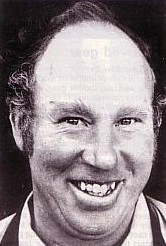 |
Nearing the end of his one-sided fight with the cancer that claimed him last week at the age of 58, Maurice Vermeulen arranged to have the tune "My Way" played at the close of his funeral service. The Dutch-born immigrant savoured outstanding success as a breeder, owner and trainer - doing things his way.
In his standardbred breeding activities, Maurice thought big. He subscribed totally to the theory that breeding the best to the best gets the best. He sought out the best families and put his mares to what he considered were the best available stallions. It was a tribute to his judgement and courage that his best horse was from a well-bred young mare he despatched across the Tasman to blend her with what he considered was the best blood ever to come out of America to Australia.
Vermeulen came to New Zealand from Holland in 1952 as a 20-year-old. He had seen and enjoyed a little trotting in his home land and Denmark, but mechanical engineering was to be his game to begin with. After first working at Wellington and Lyttleton, he moved to set up a business in Southbrook, North Canterbury. By the late 1960s, Maurice could afford to begin getting himself involved in his first love - horses.
He struck up an affinity with the Brosnan family of Rangiora, who had a strong line of the highly-successful Moonbean family. They did deals with few outsiders but leased the 1965 foal of Morris Eden and Stowaway to Maurice's wife Margaret and Templeton trainer Jack Smolenski's wife, Marie. One of Stowaway's nine winners, she raced as Margaret Marie and won her namesakes four races as a three and four-year-old before returning to the Brosnans and becoming an excellent producer.
Maurice leased and eventually exercised a $3000 right of purchase on Stowaway's 1968 foal, Robin's Sister, and after this daughter of Johnny Globe had won him and Margaret five races he put her quickly to the stud. She left several winners including the brilliant Timely Robin, whose 10 NZ Victories for the Vermeulens included a heat of the 1979 Inter-Dominions at Addington. Borrowing Stowaway herself for one year, Maurice put her to Good Time Eden and bred Royal Cheval. She won the Vermeulens six races and was second in the NZ Derby, then left several winners including Regal Cheval (7 wins), who in turn became the dam of another top-class Vermeulen pacer Speedy Cheval.
In 1969, in partnership with Christchurch clothing manufacturer John Osborne, Vermeulen paid $2700 at the National Sale for the Thurber Frost filly from the famed Purple Patch family that was Royal Belmer. Trained by Smolenski she gained 12 wins and 14 placings from 42 lifetime starts and was NZ's fastest race mare of her time with a 1:58.8 placed mark. A shy breeder, Royal Belmer nevertheless produced NZ Derby winner Sovereign for Osborne and Royal Decision, winner of 12, for Vermeulen.
In the early 1970s, Lauriston trainer Alister Kerslake offered Osborne and Vermeulen the choice of some fillies and mares he intended to sell. On the advice of Templeton trainer Derek Jones (who became one of Vermeulen's closest friends) New Guest was purchased by Osborne for $5000. By premier sire Garrison Hanover from True Guest, and thus from the prolific Derby-winning family descending from champion Indianapolis' unraced sister Tondeleyo, New Guest was a sister to high class pacer Speedy Guest.
Going sore after winning at only her second start, she was retired in 1974 to the Rangiora Raceway Farms Ltd breeding operation that had just been set up by Vermeulen and Osborne. Vermeulen by now had sold the engineering business. Things were going well. New Guest was despatched to Bernie Ahern's B J Stud in Victoria, where outstanding American stallions Kentucky and Hilarious Way had been set up in service.
New Guest's first two foals - Risky Business (by Kentucky) and Oshawa (by Hilarious Way) were sold - eventually winning in 1:58.8 and 2:00.2 in America, where they were good winners. New Guest returned to NZ with a yearling filly by Kentucky and a filly at foot by Hilarious way. On the toss of a coin, Osborne took the Kentucy filly, who, as Dixie Royal, qualified only and at stud has proved a very shy breeder.
The Hilarious Way filly was Hilarious Guest who, raced and trained by Vermeulen, won him 12 races including the NZ Juvenile Championship, NZ Sapling Stakes, NZ Derby, NZ-NI Oaks double and NZ Messenger and was twice second (to Armalight and Royden Glen) in the Auckland Cup.
A hard case with a wonderful sense of humour and a heart of gold, Maurice Vermeulen confused many of those who knew him when three years back his spark faded and he became something of an introvert. What was not known at that time was that he was suffering the advanced stages of the tumour that was to cut his successful life short.
He will be remembered and loved, not only by Margaret, son Phillip and daughters Lsa and Karina, but also the many privileged to have known him.
Credit: Ron Bisman writing in HRWeekly 8Aug90
YEAR: 1990
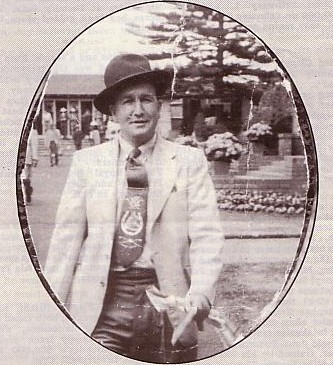 |
Merv Dean, who died at his home in Auckland just before Christmas aged 67 after a long illness, will long be remembered as the man who bought the great Cardigan Bay from the Todd brothers of Mataura. But there was much more to Merv than just that.
Merv's parents ran tobacconists in Hamilton, and in his youth Merv assisted his uncle, Henry Lee, one of New Zealand's most notorious bookmakers. Lee operated a shoe shop at Frankton, but, it is said, sold no shoes. At one point in his colourful career he completely booked out the Duke of Marlborough Hotel at Russell and staged there an unofficial convention of New Zealand bookies.
Merv moved to Auckland, where he became a billards and snooker hall proprietor. Armed with a wide knowledge of racing and its ramifications, he also became a keen student of breeding, an ardent admirer of good horses and good racing, both standardbred and thoroughbred, and an aspiring owner. It could truthfully be said that he fashioned himself into possibly New Zealand's most successful professional punter. Those closest to him, considered Merv's judgement second to none when it came to horse racing.
Merv at times punted on a level to match the late Max Harvey, but, in direct contrast to that leviathon gambler, Merv shunned publicity and throughout his life maintained a very low profile. He never asked for a privilege to go on to a racecourse. He paid his way in, and never went onto a grandstand, preferring to go to the rail, as close as he could get to the horses that he loved to bet on. At Alexandra Park, scene of 11 of Cardigan Bay's 80 wins, including two Auckland Cups, Merv's favourite vantage point was on the rail at the two-mile start in the old Derby area, where he would buy a pie and rub sholders with the workers.
Merv with his Mother raced the good pacing mare Ruth Again in the mid-1950s. The daughter of Dillon Hall was trained for them for four wins as a four-year-old by Roy Purdon (then at Te Awamutu), and later in life won them a race from Morry Holmes' Riccarton stable and another when trained at Pukekohe by Colin Hadfield.
Rapt in the progeny of the imported American stallion Hal Tryax, Merv bought from the Todd brothers in 1961 a gelding by that sire named Motif. After this pacer had won at 40-to-1 at Claudelands in March 1961, he handed him to Peter Wolfenden, from whose Auckland stable Motif was to win four more races. Boosted by a good betting win, Merv soon after bought from the Todd brothers (for £2000 and two £250 contingencies) another Hal Tryax gelding, who, as Cardigan Bay, had won two of eight three-year-old starts and three of four starts at four.
Registered in the name of Merv's wife Audrey, Cardigan Bay under Wolfenden became a champion, his numerous wins including the Auckland Cups in 1961 and 1963, the NZ Cup in 1963 and the Inter-Dominion Grand Final in Adelaide the same year. Cardigan Bay went on to further fame and fortune in America, where under Stanley Dancer, he became, as a 12-year-old in 1968, the world's first pacer to win a million dollars.
One of Merv Dean's best thoroughbreds in New Zealand was Town Guard. At one stage of his career this good galloper was disappointing, and Merv's suggestion to his trainer was to jump him over hurdles in the centre of Pukekohe. His reasoning was that slipping and sliding on the heavy clover in the infield would teach the horse to run better on the flat. His theory was borne out when Town Guard immediately won the Stars Travel Gold Cup at Tauranga, beating Lampada. Merv then sent Town Guard to Victoria and successfully punted him to win a hurdle race in Melbourne. Brought back to Baggy Hillis' Takanini stable, Town Guard was one of the early favourites for a Great Northern Hurdles when he broke down on the eve of the race.
One of Merv's closest friends, current Auckland Trotting Club president Cliff Koefoed, labels him "the greatest judge of horseflesh I have known...He had something like 70 horses, and only one failed to win a race," he said. Koefoed added: "Very tough in business, he was generous to a fault to down-and-outers. When he learned that the guy who assisted him in the billard room at Onehunga had five kids and a Morris Minor, he and Audrey gave the guy an open cheque to buy a decent car for his family."
Koeford recalls accompanying Merv on whirlwind forays to Christchurch, Wellington and even Australia for assaults on the tote and bookmakers that were usually successful. "On a Trentham trip we put £200 on Mali Peter in the first leg of the double, and when he won we put the lot all-up on Golden Defoe," continued Koefoed. "They were £1 tickets, and had to be exchanged into five shilling units. They were still punching tickets for us after the second leg horse had won. We got £2500 each. We rang our wives, Irene and Audrey, and got them to book a table and meet us that night at the "Gourmet" in Auckland, I think it was the first time Merv had ever been into a top-class restaurant to have a meal."
Merv Dean is survived by Audrey.
Credit: HRWeekly 9Jan91
YEAR: 1990
LAURIE WILLIAMS
Laurie Williams, who trained successfully for many years, firstly at New Brighton, and then at Greenpark, died recently. Aged 79, Williams held a licence for over 50 years, and took one horse to Cup class, and another to the verge of it.
His NZ Cup runner was Idaho, but he considered Goldina, who nearly made it, the best horse he trained. A motor body builder by trade, Williams trained his horses around the Estuary and along South Brighton. Goldina was one of his early ones, and although unsound, measured up to the best company.
Williams took him to Auckland in 1952, but with the waterfront strike on, he was forced to hire a little fishing boat in Picton to cross Cook Strait. It is a fact, say his family, that Goldina's tail was almost dragging in the water as the craft ploughed through the water. On reaching the North Island, Goldina was unloaded by crane into the surf at Plimmerton, where Williams caught the train and continued the trip.
Williams made a number of trips to Australia, where he made contacts and sold numerous horses. He was also a regular vendor at the national sales of yearlings.
Idaho, a son of U Scott and the Grattan Loyal mare Fleuret, raced in the 1965 NZ Cup, the Inter-Dominions in Melbourne, and ran third in the International Pace at Yonkers won by Cardigan Bay.
Other horses he raced were Piccolo, Regalia, Joyfree (Geraldine Cup), Crystalline, Lily Chase (5 wins) and Verona (5).
Credit: Mike Grainger writing in HRWeekly 3Oct90
YEAR: 1990
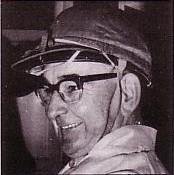 |
Bob Townley, 'Doody' and Alec's older brother, died on Sunday at the Accolade Lodge, Rangiora. Aged 82, Bob was the eldest of 10 Townley children, two of whom are left alive.
Townley drove some of the great names in harness racing, notably Harold Logan, U Scott, Supertax and a good trotter in Jenny Guy. "I think he was 13 when I won the NZ Free-For-All with Harold Logan," recalled Townley last year. "But U Scott was the fastest I ever sat behind." That U Scott was to make a name for himself as a sire and then as a broodmare sire which was a paradox to Townley. "Gallant Knight was a good horse, a beauty, but at stud he left nothing," he said. "U Scott was a cranky, hard-pulling horse yet left a host of winners." According to Townley, U Scott was a two-minute pacer but never got the opportunity to try. "He would have run two minutes without any bother," he said. "U Scott was a hard-case but he could fly."
Townley trained at Winchester, Orari, Nightcaps, Papanui and for Dave Rogers, who had boxes at the Islington Hotel.
'Doody' recalls him winning the Methven Cup with Regal and many races for Henderson Hunter, including the 1940 Auckland Cup with Ned Worthy driven by the late Billy Doyle. Ned Worthy was raced by Southlander Henderson Hunter, father of the current trainer. He employed Townley to take care of his horses and it was his first job in trotting after starting off with his father, Bob senior, at Winchester. "Mr Hunter had a lot of good horses from the First Water family, and Ned Worthy won the first three-year-old race to be run in Southland in his year," Bob said after he had qualified Centre this time last year.
Credit: NZ HRWeekly 7Jun90
YEAR: 1989
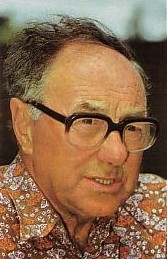 |
Six months after his age forced Colin McLachlan to retire from driving, the Templeton horseman has decided to sell his farm and business, move into town and almost make a clean break from harness racing.
Colin and his wife Sylvia have owned four shoe stores in and around Christchurch for nearly 40 years, with Colin also succeeding as an owner/trainer of standardbreds. But now the McLachlans have sold their stores, as well as their 16 hectare training establishment in Templeton. "Since my health hasn't been the best I've decided to sell up. I used to enjoy driving at the trials but I can't even do that now - that takes some of the interest away," Colin says regretfully.
Born in Dunsandel in 1923, Colin's first equine experience was working with Draught horses on the family's farm. He first handled standardbreds when his neighbour, the late O E ("Ossie") Hooper, took a small team with Ben Grice on the then popular Hawera circuit. Colin looked after the remainder of Hooper's team while he was away.
After Colin left school he spent six years in the Air Force before trying his hand at various jobs, including engineering. Colin stumbled across the shoe business when his wife Sylvia was employed at Eastmonds Shoe Store. One night when Colin went to pick her up, Sylvia's employer asked him how he spent his Friday nights. "I told him I never did anything in particular so he asked me if I wanted to work part-time on that night," Colin recalled. The occasional work soon turned into full-time employment and seven years later he was managing his own store in Armagh Street, directly across the road from the present-day store.
Colin and Sylvia's only son, Wayne managed the business in its latter years, but was tragically killed in a car accident three years ago. An avid rugby fan and long-time supporter of the Christchurch Club, Colin designed a light-weight football boot and wholesaled them throughout the country in the late 1960's. The 1967 All Blacks to Britain and the 1970 All Blacks that toured South Africa, wore the McLachlan-designed boots.
The first horse Colin owned was Status, who he raced in partnership with his friend Syd Rassie. The pair bought Status off Ben Grice. The Morano entire was trained by Peter Yeatman but he was still a maiden when he was sold to America. Colin and Syd then leased and later bought the Thurber Frost mare Miss Frost who won four races on the West Coast circuit, including the 1968 Greymouth Cup. "We were out celebrating after Miss Frost's Greymouth Cup win and a guy called Gordon Elley came up to me and said he had a horse at home that would lap my mare," he said. Caught in all the excitement and soaking up the famous West Coast hospitality, Colin shouted: "I'll buy him." The horse was General Demand, who went on to win seven races including the Winter Cup before also being sold to the States.
Before training his first horse, Lachlan Bay, Colin owned Flying Home, who won the Gore and Winton Cups as well as four other races. In his first training season, Colin won 20 races, and thought the game was easy, but he was brought back to earth the following term when successful only once. Other winners from the McLachlan team include: San Sebastian, Mighty Tuft, Scottish Chief, Flying Tempest, Way Lynne, Whata Cutie, Jack Shine, Golden Casanova, Tickle My Fancy, Lord Charles, Formal Fella, Big Brute and dual Derby winner Mighty Me.
Flying Tempest provided Colin with his first driving success at Addington, when the horseman was 47 years old. Jack Shine still holds the New Zealand record for a 3-year-old over a mile (stand). His 2:03.8 was set in June, 1982, on a wet Waterlea surface.
Formal Fella and Mighty Me were purchases from the 1981 National Yearling Sales at Addington, but if Colin had had anything to do with it, Formal Fella would've been the only yearling he took home from the sale. "While I was paying for Formal Fella, Sylvia bid for and bought Mighty Me," he said.
Colin says he owes a lot of his success to Christchurch reinsman Bob Cameron, who he ranks as world class.
Colin says he intends to auction his large band of broodmares, foals and racehorses in the near future. And although selling up and getting (almost) right out of the game, Colin just happened to have his finger up at the right time at the NZ Premier Yearling Sale last month. Knocked down to him for $9000 was a Talk About Class colt out of NZ Oaks winner Swift Princess. "I couldn't let the son of an Oaks winner go that cheap," Colin said. So even at a solemn stage of his career, Colin is still keen to play a minor part in harness racing.
Credit: Steve Wilson writing in HRWeekly 1Feb89
| << PREVIOUS | 1 2 3 4 5 6 7 8 9 10 11 12 13 14 15 16 17 18 19 20 21 | NEXT >> |